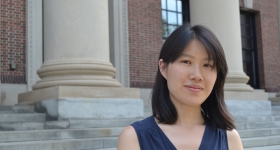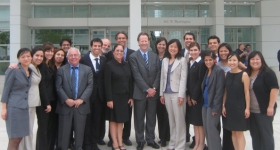Last year, I gathered with some two hundred other Korean Americans for a church wedding. I was perhaps one of three women who arrived without a date and one of two atheists in the entire crowd. The couple to be wed was, of course, Korean American: the groom, a youth pastor I knew from college; the bride, a bubbly woman he had met at church in California. As I lined up to tender my gift and find my seat in the pews, I already felt the chill of alienation.
The wedding was a full church service, replete with prayers and praise music. When it came time for the scripture reading, a young woman rose to the dais. She called out “Ephesians 5:22,” prompting the shuffling of tissue-fine Bible paper:
Wives, submit to your husbands as to the Lord. For the husband is the head of the wife as Christ is the head of the church, his body, of which he is the Savior. Now as the church submits to Christ, so also wives should submit to their husbands in everything.
Husbands, love your wives, just as Christ loved the church and gave himself up for her to make her holy, cleansing her by the washing with water through the word, and to present her to himself as a radiant church, without stain or wrinkle or any other blemish, but holy and blameless. In this same way, husbands ought to love their wives as their own bodies. He who loves his wife loves himself. After all, no one ever hated his own body, but he feeds and cares for it, just as Christ does the church -- for we are members of his body. “For this reason a man will leave his father and mother and be united to his wife, and the two will become one flesh.” This is a profound mystery -- but I am talking about Christ and the church. However, each one of you also must love his wife as he loves himself, and the wife must respect her husband.
(Ephesians 5:22-33, New Testament, New International Version.)
After the reading, the young Korean American pastor approached the pulpit. He opened with disarming stories about the bride and groom and offered sage advice from his own, apparently blissful, marriage. His “my wife’s always right” brand of self-deprecation, however, was the prelude to a very conservative sermon. He took the Ephesians verses at face value, emphasizing that wives must be free of blemish and subordinate themselves to their husbands, not because women are inferior, but because gender-delineated roles lead to a happy home.
As he preached, I searched the audience for signs of incredulity. To my dismay, each guest was more attentive than the next, laughing on cue, nodding, taking notes. The groom’s side of the church was filled with Yale graduates, many of them women I knew, but their eyes betrayed not a hint of surprise or skepticism at the message being espoused. These were women of high intelligence, ambition, and worldliness who had, inexplicably, subscribed to an orthodox, purportedly Biblical notion of gender relations that rendered them subservient to their male partners.
Since the wedding, I have reflected at length on how it felt to sit in that church. Although I am not a believer, it was neither the liturgy nor the scripture that got to me. Rather, it was the sense of displacement, the feeling that I could not be properly Korean American outside the confines of that place. An astounding 70 percent of the 1 million-plus ethnic Koreans in the United States identify themselves as Christian. Of this, approximately 131,000 belong to either the Southern Baptist Convention or the Presbyterian Church (U.S.A.), two of the most conservative evangelical denominations. Another 90,000 Korean Americans are adherents of the Catholic Church. On college campuses, Korean American students are overwhelmingly active in Protestant student organizations, including ethnically specific campus ministries, according to Rebecca Kim, a professor at Pepperdine University and the author of God’s New Whiz Kids?: Korean American Evangelicals on Campus.
Ironically, during high school and most of college, I was a committed, if not entirely credulous, Christian. And to some extent I had grown up in the church, for although my parents were and still are atheists, they took us to services in the hope that my brother and I would befriend other Korean American kids. Indeed, church for me was as much a social experience as a religious one, but it was the political culture of Korean-style Christianity that ultimately led me to reject its tenets.
Raised as a feminist with leftist leanings, I understand Jesus’ gospel to be one of liberation and justice, meaning a real commitment to equality and social engagement. Over the years, as I wound my way through a number of Korean American congregations on both coasts, it became clear that my political views were terribly out of sync with these churches’. Even in English-speaking, second-generation services, women were shunned for leadership roles, homosexuality was demonized, and social justice was limited to the occasional food drive. In the churches that boasted considerable aggregate wealth, there was no tradition of philanthropy or dialogue about societal inequalities. Second-generation churchgoers -- acculturated, upwardly mobile, and, unlike their parents, not reliant on church as a linguistic redoubt -- were nevertheless practicing their faith in an insulated, anachronistic bubble. Even now, as we move into our third generation of immigrants, church remains ascendant as Korean America’s cultural center.
The time has come for a reorientation. While I have nothing against any individual’s religious commitments, I strongly believe that Korean America needs a new locus, or new loci, of community outside the church. If we care about social justice and believe that Korean Americans as a group -- as opposed to individual Koreans participating in non-ethnic collectives, for instance -- can contribute something unique, then we must take stock of where we are and where we hope to go. Progress will mean rejecting certain of our parents’ and churches’ teachings -- passivity in women, social disengagement, acceptance of the status quo, and a disturbing insularity -- and channeling some of the traditions we have forgotten, such as Korea’s long history of activism and class struggle.
To move us forward, I first want to trace us back. Our English-speaking, second-generation congregations derive from and are often housed within first-generation churches. It seems to me that this provenance and patronage has shaped our community in some unfortunate ways.
Growing up in Tacoma, Washington, I attended Korean churches mostly populated with working-class, first-generation immigrants. These men and women spent their days in corner stores, dry cleaners, and nail salons, sometimes as the bosses but often as employees. Many of the elderly attendees lived on public assistance and in government apartments. There were also a number of women wed to US servicemen, raising issues of identity and belonging. They were congregants, in other words, who had a lot to say about gendered and raced hierarchies and the burdens of economic survival.
For these members of the American underclass, Sunday could have represented an opportunity to apply Jesus’ egalitarian teachings. Every church meeting could have been a chance to problematize hierarchies and conservative politics, none of which had ever operated in their favor. But no culture of protest, no liberation theology akin to that in African American churches, ever emerged. Church instead became a theater in which to enact compensatory social dramas. Dressed to the nines and seeking legitimating titles such as “elder” or “director,” first-generation members played the role of people who had made it in American society. The churches I saw in my adolescence were awash with business dealings and competitive capitalism: the show-and-tell of expensive purses, luxury cars, overlarge tract houses, and entrepreneurial success. In one such church, the weekly bulletin would announce the top offering-givers from the previous Sunday. That same church, in a year of Pacific Northwest flooding, refused to store the soggy belongings of displaced elderly Koreans.
Church was a place to feel self-satisfied and to distinguish oneself from the under-underclass. First-generation pastors preached on the subservience of women, encouraged their parishioners to attend anti-gay protests, and lent credence to the prosperity gospel, the idea that faith is rewarded materially. Under the aegis of bourgeois Christianity, immigrant men could pad their egos by mistreating their wives and children. Even if life wasn’t perfect in that 24-hour deli, the thinking went, it was still better than being a woman or poor or gay. I recall one pastor’s vituperative sermon against homosexual marriage. He railed against the immorality of this concept, while his son, who had come out to him a few months earlier, sat quietly in the rearmost pew. Around the same time, this church upheld the “elder” status of a repeat batterer, revoking his title only when his wife showed up with a broken arm.
These may be outlying examples, and it is easy enough to criticize our parents’ generation of churches. But my concern is that younger congregations exhibit similar features. Queens College Professor Pyong Gap Min has observed, for example, that second-generation churches are as patriarchal as their forebears, but under the banner of scriptural rather than Confucian authority. As my opening anecdote illustrates, the Korean American church continues to incubate a culture in which women accept lesser roles and authority goes unquestioned. Second-generation churches, divorced as they are from a social justice gospel, fail to challenge middle-class values focused on consumption, accumulation, and social stability.
This would be less problematic if Korean America were tangibly located outside the church. After all, every ethnic and racial group has its conservative members. But with so many Korean Americans raised and trained in the ways of the church, our community is disproportionately under the influence of these institutions and their regressive politics.
What this points to -- insofar as we care about social progress and choose to approach it in part as “Korean Americans” -- is the need to imagine ourselves in new, open-ended ways. Here our lineage may help us, for embedded in Korea’s troubled history is a long tradition of revolt and self-determination. Groups like Koreatown Immigrant Workers Alliance in Los Angeles and Nodutdol for Korean Community Development in New York City are organizing working-class immigrants and second-generation Korean-Americans according to this particular strain of progressivism. There are social services providers, political action groups, arts collectives, LGBTQ centers, and feminist organizations who offer other, unorthodox visions of the Korean American community. None of these are necessarily incompatible with religion; they instead signal the diaspora’s many moving parts and suggest the limits of Korean American church dogma.
Without the balancing effect of secular community networks, a church-centered Korean America will risk succumbing to the demagoguery and political opportunism of the Religious Right and the Tea Party. Glen Beck and Sarah Palin, rallying some 300,000 acolytes at the Lincoln Memorial in August, preached a dangerous conflation of ill-defined Christianity, conservative morality, and uncritical politics. I should hope we can, collectively, do better than this.
A broadened base of Korean America will hardly sound the death knell for Christian institutions. Rather, with parishioners rooted both in their churches and other Korean American organizations and community spaces, a diversified discourse will open up, one that attends to global concerns and honors its participants equally. Churches themselves could involve Korean Americans in progressive political dialogue, raise women leaders, and encourage support for class struggles. It is a necessary step in our evolution and a timely project of reform.
Adapted from “Toward a Korean-American Reformation,” originally published in Senses: The Korean American Journal, Yale College, Fall 2010.










Comments
Thanks for your comment, but I'm a bit confused: you say you agree with the thesis, but the example you give of social-justice intervention is fighting cigarette smoking, which is precisely the kind of thinking I am critiquing.
Indeed, the question of locus/coherent identity is key. In the article I disclaim it, set it out, as a premise, but why--well, I think it's because we're still a discrete, distinguishable diaspora with certain defining characteristics and community boundaries. It's not for everyone, and we see that K-As and other APIs often choose not to affiliate. To the extent we do choose to affiliate, however, we can go in a better ethical direction.
Thanks. Some of your comments are interesting, others flip and less helpful. In any case, perhaps you noticed in the article that I'm an atheist; I'm not in seminary like you. So I'm not sure why I'm responsible for directly participating in church reforms. Moreover, according to your logic, no outsider, no ostensibly "foreign" theory or history, is applicable to a given situation.
Did you read this article? Your "instinctive urge" apparently didn't get you past the lede.